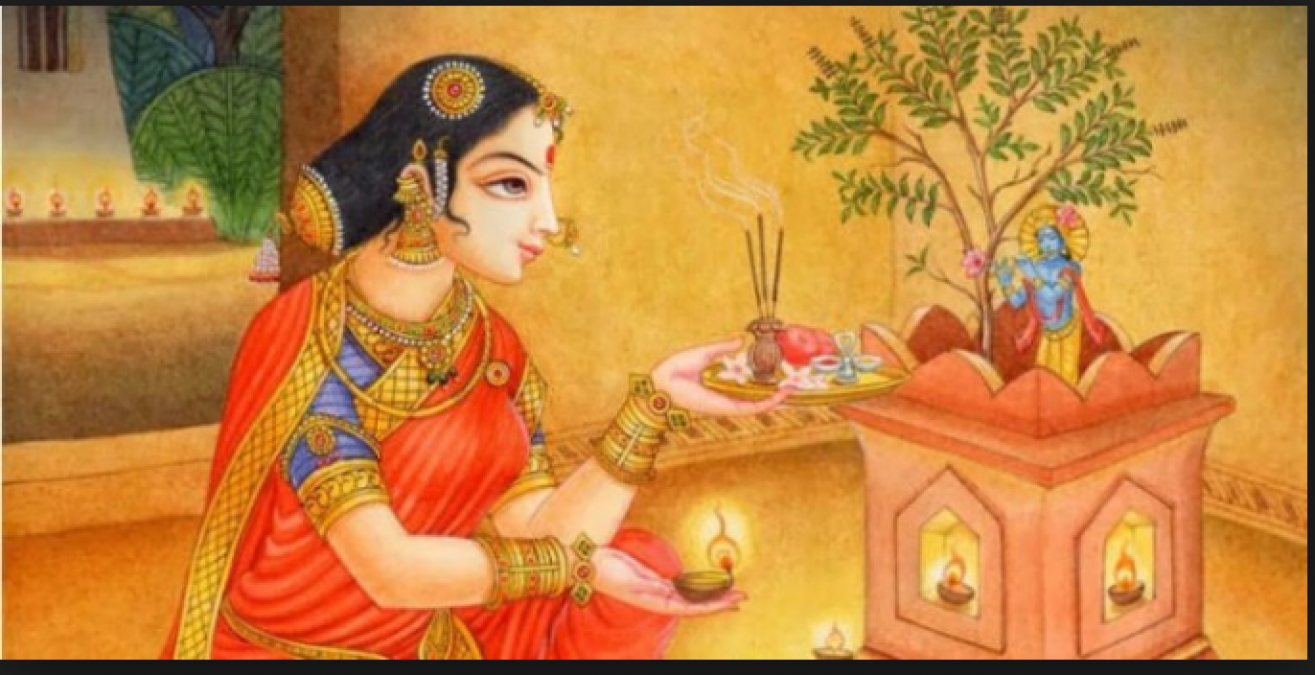
The 'tulsi' plant or Indian basil is an important symbol in the Hindu religious tradition. The name 'tulsi' connotes "the incomparable one". Tulsi is a venerated plant and Hindus worship it in the morning and evening. Tulsi grows wild in the tropics and warm regions. Dark or Shyama tulsi and light or Rama tulsi are the two main varieties of basil, the former possessing greater medicinal value. Of the many varieties, the Krishna or Shyama tulsi is commonly used for worship.
The Holy Herb Places that tend to inspire concentration and places ideal for worship, according to the 'Gandharv Tantra,' include "grounds overgrown with tulsi plants". The Tulsi Manas Mandir at Varanasi is one such famous temple, where tulsi is worshiped along with other Hindu gods and goddesses. Vaishnavites or believers of Lord Vishnu worship the tulsi leaf because it's the one that pleases Lord Vishnu the most. They also wear beaded necklaces made of tulsi stems. The manufacture of these tulsi necklaces is a cottage industry in pilgrimages and temple towns.
Tulsi As an Elixir Apart from its religious significance it is of great medicinal significance and is a prime herb in Ayurvedic treatment. Marked by its strong aroma and astringent taste, tulsi is a kind of "the elixir of life" as it promotes longevity. The plant's extracts can be used to prevent and cure many illnesses and common ailments like common cold, headaches, stomach disorders, inflammation, heart disease, various forms of poisoning and malaria. Essential oil extracted from karpoora tulsi is mostly used for medicinal purposes though of late it is used in the manufacture of herbal toiletry.
also read Poornima and Amawasya: Fasting and observations on Full Moon and New Moon
Tulsi As a Deity The presence of tulsi plant symbolizes the religious bent of a Hindu family. A Hindu household is considered incomplete if it doesn't have a tulsi plant in the courtyard. Many families have the tulsi planted in a specially built structure, which has images of deities installed on all four sides, and an alcove for a small earthen oil lamp. Some households can even have up to a dozen tulsi plants on the verandah or in the garden forming a "tulsi-van" or "tulsivrindavan" - a miniature basil forest.
A Herbal Remedy According to Jeevan Kulkarni, author of 'Historical Truths & Untruths Exposed,' when Hindu women worship tulsi, they in effect pray for "less and less carbonic acid and more and more oxygen - a perfect object lesson in sanitation, art, and religion". The tulsi plant is even known to purify or de-pollute the atmosphere and also works as a repellent to mosquitoes, flies and other harmful insects. Tulsi used to be a universal remedy in cases of malarial fever.
also read Hinduism: Popular Ancient Law ‘Manu’ (Manava Dharma Shastra)